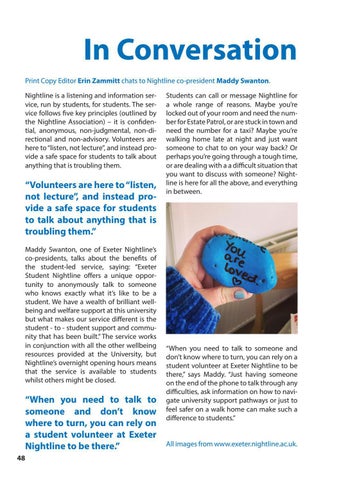In Conversation Print Copy Editor Erin Zammitt chats to Nightline co-president Maddy Swanton. Nightline is a listening and information service, run by students, for students. The service follows five key principles (outlined by the Nightline Association) – it is confidential, anonymous, non-judgmental, non-directional and non-advisory. Volunteers are here to “listen, not lecture”, and instead provide a safe space for students to talk about anything that is troubling them.
“Volunteers are here to “listen, not lecture”, and instead provide a safe space for students to talk about anything that is troubling them.” Maddy Swanton, one of Exeter Nightline’s co-presidents, talks about the benefits of the student-led service, saying: “Exeter Student Nightline offers a unique opportunity to anonymously talk to someone who knows exactly what it’s like to be a student. We have a wealth of brilliant wellbeing and welfare support at this university but what makes our service different is the student - to - student support and community that has been built.” The service works in conjunction with all the other wellbeing resources provided at the University, but Nightline’s overnight opening hours means that the service is available to students whilst others might be closed.
“When you need to talk to someone and don’t know where to turn, you can rely on a student volunteer at Exeter Nightline to be there.” 48
Students can call or message Nightline for a whole range of reasons. Maybe you’re locked out of your room and need the number for Estate Patrol, or are stuck in town and need the number for a taxi? Maybe you’re walking home late at night and just want someone to chat to on your way back? Or perhaps you’re going through a tough time, or are dealing with a a difficult situation that you want to discuss with someone? Nightline is here for all the above, and everything in between.
“When you need to talk to someone and don’t know where to turn, you can rely on a student volunteer at Exeter Nightline to be there,” says Maddy. “Just having someone on the end of the phone to talk through any difficulties, ask information on how to navigate university support pathways or just to feel safer on a walk home can make such a difference to students.” All images from www.exeter.nightline.ac.uk.
